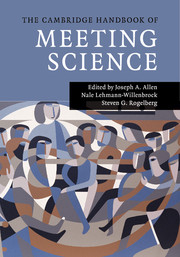Book contents
- The Cambridge Handbook of Meeting Science
- The Cambridge Handbook of Meeting Science
- Copyright page
- Dedication
- Contents
- Tables
- Figures
- Contributors
- Book part
- Part I Introduction
- Part II Premeeting Activities and Context
- Meeting Setup
- Meeting Composition
- Premeeting Communication
- Macro Meeting Context
- 9 Meetings All over the World
- 10 An Organizational Meeting Orientation
- 11 A Systemic View of Meetings
- Part III The Meeting Itself
- Part IV Special Types of Meetings
- Part V Synthesis and Conclusion
- Book part
- Author Index
- Subject Index
- References
11 - A Systemic View of Meetings
Windows on Organization Collective Minding
from Macro Meeting Context
Published online by Cambridge University Press: 05 August 2015
- The Cambridge Handbook of Meeting Science
- The Cambridge Handbook of Meeting Science
- Copyright page
- Dedication
- Contents
- Tables
- Figures
- Contributors
- Book part
- Part I Introduction
- Part II Premeeting Activities and Context
- Meeting Setup
- Meeting Composition
- Premeeting Communication
- Macro Meeting Context
- 9 Meetings All over the World
- 10 An Organizational Meeting Orientation
- 11 A Systemic View of Meetings
- Part III The Meeting Itself
- Part IV Special Types of Meetings
- Part V Synthesis and Conclusion
- Book part
- Author Index
- Subject Index
- References
Summary
Treating meetings collectively as a unit of analysis enables a holistic view of their theoretical foundations, their practical operation, and potential contribution to organizations. We draw on concepts from systems and process thinking, sensemaking and sensegiving, and organizational collective mind to inform a systemic conceptualization of organizational meetings. A systemic conceptualization of organizational meetings sees meetings as interconnected elements in an ongoing process of organizational sensemaking, rather than as discrete or isolated events. Using data from more than 60 meetings in one organization, we develop a systemic meetings model incorporating retrospective and prehensive sensemaking as the principal categories of connections between past, present, and future meetings. A systemic perspective on meetings views them not only as an integrated whole but also as a process of connected events unfolding in time. The emergent organizational process is termed “collective minding,” requiring greater mindfulness of how meetings are deployed and increased heedfulness of how they are interconnected in practice. Collective minding accounts for how meetings systemically manifest, contribute to, and sustain collective mind over time in organizations.
- Type
- Chapter
- Information
- The Cambridge Handbook of Meeting Science , pp. 223 - 244Publisher: Cambridge University PressPrint publication year: 2015
References
- 6
- Cited by

